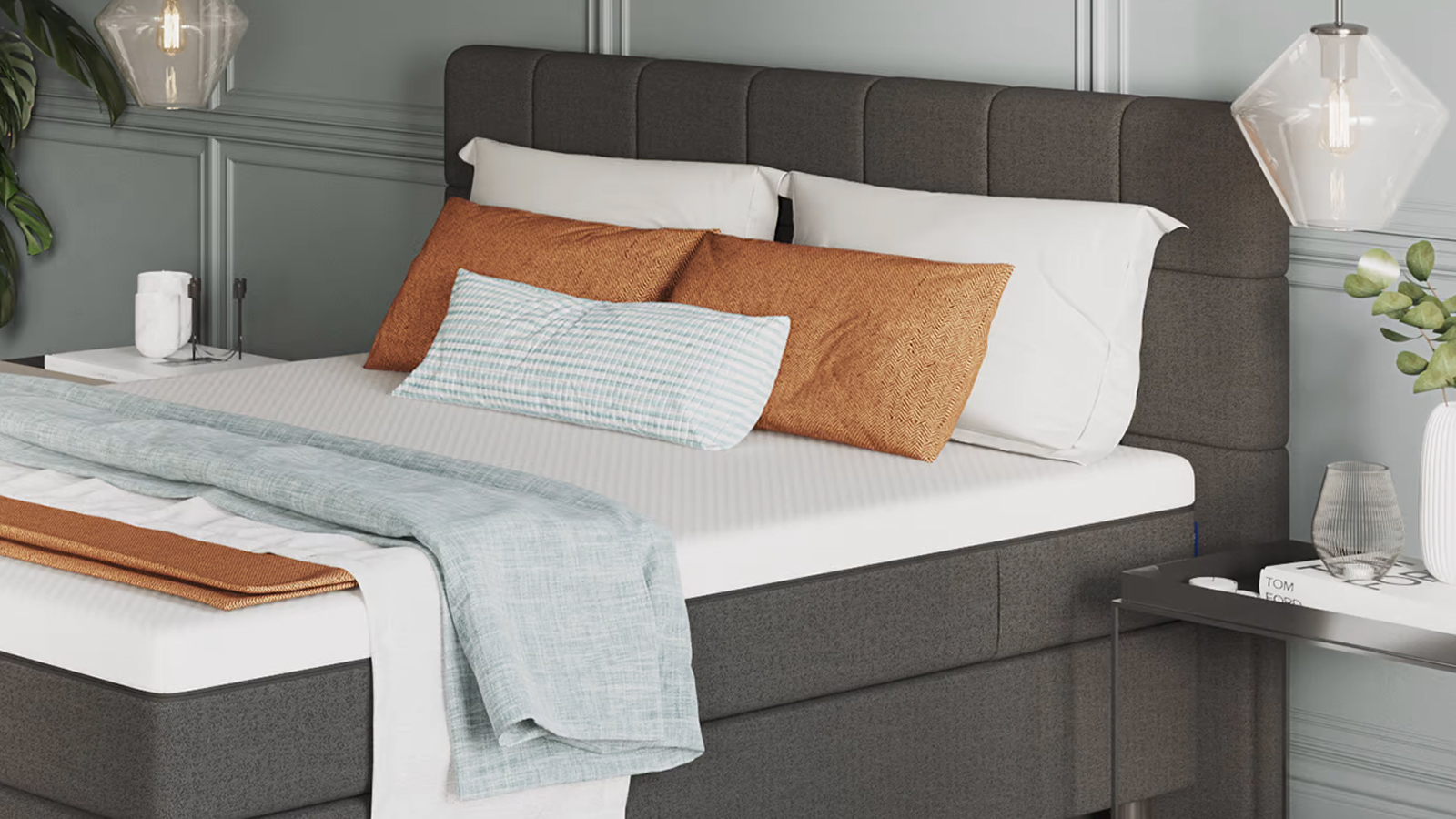What is an orthopedic mattress and how can it improve your sleep?
Our in-depth guide explores the pros and cons of this mattress type

What is an orthopedic mattress? Simply put, this type of mattress is essential if you tend to suffer from back pain, wake up with aches or struggle to get your body comfortable as you sleep. Not only is it the best mattress for providing pain relief but it will also benefit your wellbeing – leading to great sleep every night and you feeling refreshed each morning.
An orthopedic mattress is built to support your posture and ensure your spine is in the best position for sleep. Although they aren't all described as such, we'd consider many of the models in our best mattress for back pain and best firm mattress guides to be orthopedic. It typically has a firmer feel, while still balancing coziness, comfort, and cooling. However, because this supremely supportive mattress is usually made with higher-quality material and features a more innovative design, it tends to be on the more expensive.
Here, we'll be taking a closer look at what an orthopedic mattress is and how buying one can improve your sleep.
What is an orthopedic mattress?
Orthopedic mattresses are designed to offer proper support for all sleepers, but they can especially benefit anyone who suffers from back pain or joint pain, frequently wakes up feeling achy, or is recovering from an illness or injury.
Firmer in feel, an orthopedic mattress will keep your spine properly aligned whilst providing excellent pressure relief. This will help alleviate back pain so you don't wake up sore or stiff.
This mattress type is typically firmer in feel, as this is needed to keep the spine aligned and in a neutral position. While you might not specifically find the term ‘orthopedic’ in the description if you need extra support look for a firmer mattress designed with extra features such as special comfort layers and high-quality memory foam that cushions the pressure points.
How much do orthopedic mattresses cost?
Because orthopedic mattresses are manufactured using high-quality materials and extra design elements (such as zoned comfort and supportive top layers), they tend to be more expensive than standard mattresses. Using the best materials and design is crucial when it comes to making sure the mattress always performs well and doesn’t sag too quickly under wear and tear.
Prices for orthopedic mattresses tend to sit at the mid to higher end of the mattress market — from around $1,200 / £1,100 onwards — but when you factor in how long mattresses last when they're well-made, you're getting great value for money. Plus, frequent mattress sales will help you keep some extra cash in your wallet.
In the US, check out the medium-firm Helix Midnight mattress, which retails for $1,199 (in queen) – but it's usually up to $150 off during regular Helix mattress sales. (Meanwhile, read our Helix Midnight mattress review to learn why it's a great choice for side sleepers who also deal with back pain.)
On the higher end of the scale, the Tempur-Pedic TempurAdapt mattress utilizes NASA-developed material for superior pressure relief. It's available as a full-foam mattress or hybrid and goes for $2,449 in queen when not on sale – but browse Tempur-Pedic mattress sales for ways to save. And bear in mind that if you're buying a mattress for medical reasons, you may be able to get Medicare assistance; see our guide to what types of mattresses are covered by Medicare for more information.
In the UK, the adaptive Emma Premium mattress features six layers of foam for extra support. It has an RRP of £1,099 for a double, though you can find it discounted in Emma mattress sales. For something firmer, the Tempur-Pedic Tempur Supreme mattress starts at £1,999 for a double and comes in three profile sizes so you can opt for a higher or lower bed to suit your mobility level.
What are orthopedic mattresses made of?

Orthopedic mattresses are usually constructed in layers that work together to ensure the very best comfort and support.
The top cover often features breathable material (like cotton), or softer quilted options that offer a gentle layer of added comfort.
Directly underneath the top cover will be a pressure-relieving layer, which is typically memory foam (or latex it's an organic mattress) to help cushion the joints and pressure points. If you are recovering from an injury or are lighter in weight, this layer can offer much-needed relief from soreness. Memory foam is a great choice for an orthopedic mattress as it easily conforms to the body to give sleepers support where they most need whilst also keeping the spine neutral.
Under this pressure-relief layer will be a support layer (or two). This could either be composed of innersprings (if your bed is a hybrid) or a denser layer of foam to keep the mattress firm.
The base layer will be the firmest layer. This is crucial for a sturdy foundation that keeps the mattress always durable, steady, and supportive.
- Read more: What is a mattress foundation?
Are orthopedic mattresses comfortable to sleep on?
Because they're designed to offer exceptional support, orthopedic mattresses tend to be medium firm to firm. This makes them the best type of mattress for back pain because it enables the spine to rest comfortably.
However, some sleepers may find this a little too hard. For instance, if you are lighter in weight or primarily sleep on your side, you may not want a mattress so rigid that it doesn’t adequately cushion your pressure points. Adding a mattress topper or mattress pad can help soften the surface of an orthopedic mattress without losing the support.
If you sleep hot, these mattresses should adequately regulate your temperature, as many have sweat-wicking covers and cooling technology that keeps the mattress comfortable to sleep on. Hybrid mattresses tend to offer more cooling, as air can freely pass through the spring layers. The best cooling mattresses offer a keen blend of support and breathability.
Many brands — such as Saatva, Helix, GhostBed and Tempur-Pedic — offer a whole range of supportive mattresses in different firmness levels, heights, and comfort ranges to help each individual sleeper get exactly what they need. After all, no two people sleep exactly the same.
How long do orthopedic mattresses last?
If it's kept in good condition with a mattress protector, an orthopedic mattress will keep you sleeping well, night after night – at least 10 years, on average. It'll also help to know how to clean a mattress so it'll last you many restful slumbers.
Obviously, the higher the quality of the mattress then the longer it will last. The top manufacturers offer a mattress warranty of at least ten years, with some brands even providing coverage for life. The length of the warranty is usually a good indicator of a brand’s trust in its product.
Buying a mattress online sight unseen can be intimidating. Fortunately, mattress trials are a common practice among the best brands – offering anywhere from three months to a full year to test it. In most cases, you can return the mattress for free before the trial period is up if it doesn't work out. (Some brands, like Saatva, charge for return delivery.)
Read our guide to how long does a mattress last to find out about the expected lifespans of different types of mattresses, as well as some great tips on how to make your mattress last longer.
Do orthopedic mattresses need a box spring?
To perform as its best, an orthopedic mattress will need a firm base that is either solid or has slats that are spaced no more than 2 to 2.75 inches apart. Any wider and your mattress will not have the proper foundation it needs to adequately support your body.
Some mattresses also work well with box springs, especially if you are after added height or want a little more bounce. However, bed frames with slats are typically more versatile than box springs, and are far less bulky too.
To find out whether slats or a box spring is best for your mattress, check the warranty terms. Depending on the mattress, using a box spring can actually void the warranty altogether, so be careful.
- Read more: What is a box spring?
Who should buy an orthopedic mattress?

A supportive, comfortable mattress is essential for everybody, no matter what. But if you need extra support, then an orthopedic mattress might be a smarter choice. Here are some reasons why you might need an orthopedic mattress:
- You often wake feeling stiff and sore
- You have joint or back pain
- You are recovering from an injury or illness
- You are heavier in weight
Fortunately, there is a wealth of choice when it comes to finding the best orthopedic mattress for your needs, no matter your sleep style. If you suffer from persistent back pain or any other pain, then check with your physical therapist first, who should be able to advise on what is the best orthopedic mattress for you.
Who shouldn’t buy an orthopedic mattress?
If you share a bed, the firm nature of an orthopedic mattress might not be suitable for both you and your sleep partner. However, you can opt for a split king (which is two twin mattresses together side-by-side) so there is a suitable firmness for each sleeper.
Another reason why you might want to avoid buying an orthopedic mattress is cost. If you are on a budget or only need a bed for a guest bedroom or occasional use, then you may want to find a suitable cheap mattress instead. However, orthopedic mattresses are often built to last, which usually makes them excellent value for money, despite the initial outlay.
Finally, if you are lighter in weight or tend to sleep mostly on your side, you might prefer a softer surface to sleep on. But, if you still need the support on offer from an orthopedic mattress, then a mattress topper or mattress pad will help cushion your pressure points comfortably whilst maintaining the level of support.
What is an orthopedic mattress: Summary
Orthopedic mattresses are designed to offer the very best support for your posture, which is essential if you are prone to back and joint pain, or recovering from an injury. They're designed to be firmer so that your body doesn’t sink in too deep, which can cause the spine to be thrown out of alignment, as well as make you too hot – two things that can contribute to bad sleep.
In the US, take a look at brands like Tempur-Pedic, Helix, and Saatva for an orthopedic mattress that'll provide you with ample pressure relief. (Our Saatva Classic mattress review explains how this bed is approved by the Congress of Chiropractic State Associations You'll be able to choose the firmness and/or profile you'd like so you can tailor your mattress to your needs. Assuming you're purchasing a queen bed, expect to spend at least $1,200 on the lower end, or beyond $2,500 for a more premium build.
In the UK, expect to spend anywhere from £1,100 to £2,000-plus for a double orthopedic mattress. Brands to keep an eye on include Emma and Tempur-Pedic. However, on either side of the Atlantic, you can browse Nectar mattress sales for an affordable, supportive option from as low as $1,000 / £800.
An orthopedic mattress will make a huge improvement in the quality of your sleep, but don't discount the benefits of resting your head on one of the best pillows. When paired with the right mattress, you'll experience high-quality sleep that'll greatly reduce the number of times you wake up achy or sweaty.
Is this the mattress type for you? Check out today's offers on the best orthopedic mattresses below...
Read more:
Sign up to get the BEST of Tom's Guide direct to your inbox.
Get instant access to breaking news, the hottest reviews, great deals and helpful tips.

Claire is a Certified Sleep Science Coach and the Senior Sleep Editor at Tom's Guide who curates our mattress buying guides and oversees our rigorous mattress testing procedures. Claire has over 16 years’ product review experience and is connected to a wealth of globally renowned sleep experts including mattress designers and buyers, neuroscientists, and doctors of sleep medicine. Claire is responsible for all mattress and sleep content published on Tom’s Guide and is our expert on Saatva, DreamCloud, and Nectar mattresses. Claire is also certified to advise people on how to choose a mattress that suits their needs and budget, as well as helping them to create a nighttime routine and bedroom environment that helps them sleep better.
